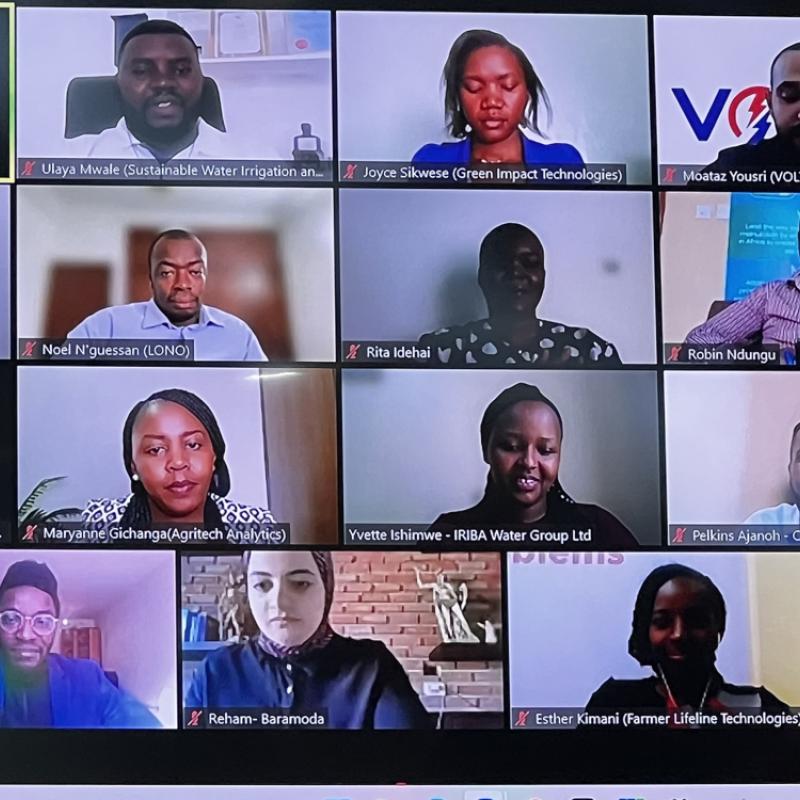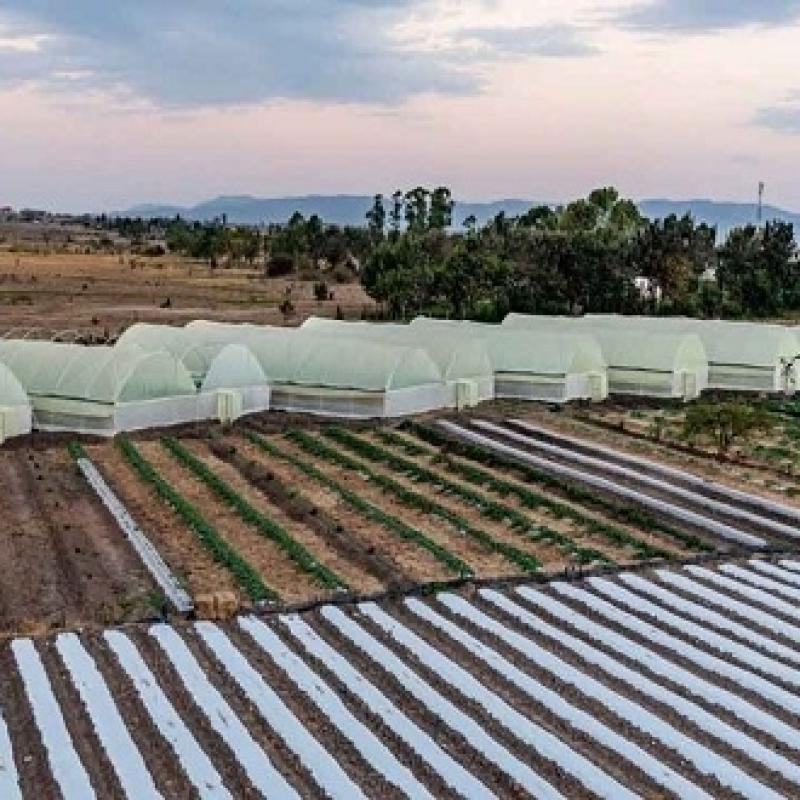
AAAP in the Media
Displaying 1 - 12 of 28
Global Center on Adaptation, AfDB host regional forum on the future of resilient food systems in Africa
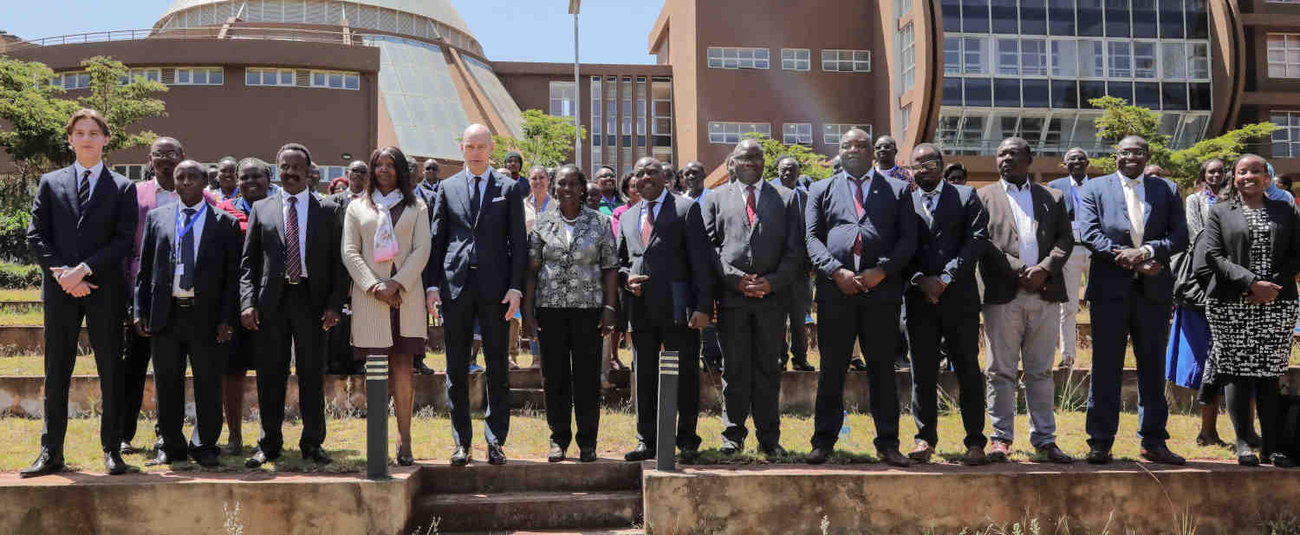
The Global Center on Adaptation (GCA) in collaboration with the African Development Bank and the Wangari Mathai Institute have concluded a three-day regional forum on the future of resilient food systems in Africa.
The Forum, called the Future of Resilient Food Systems in Africa – AAAP Digital Solutions for a Changing Climate provided training aimed at strengthening the capacity of stakeholders from across Eastern Africa to design and implement solutions to improve food security and climate resilience and to facilitate knowledge sharing among farmers on approaches to scale up the use of Digital climate-informed advisory services, or DCAS.
Digital climate-informed advisory services are tools and platforms that integrate climate information into agricultural decision-making. These services range from digital mobile apps, radio, and online platforms to digitally enabled printed bulletins based on climate models and extension services that utilize climate information platforms.
DCAS offers crucial opportunities to build the resilience of small-scale producers in the face of worsening climate change impacts. From seasonal forecasts to pest advisories, effectively designed services provide producers with the resources to adapt to climate shocks and plan for new climate conditions.
Globally, more than 300 million small-scale agricultural producers have limited or no access to such services because service provision is still fragmented, unsustainable beyond project cycles, and not reaching the last mile.
Speaking at the opening ceremony of the forum, Professor Patrick Verkooijen, CEO of Global Center on Adaptation called for urgent financial support to put Africa on the path of food sovereignty.
“Africa needs urgent support to scale up the implementation of adaptation solutions that are already yielding good results for irrigation, developing drought-resistant seeds, crops and livestock diversification, “ he said.
“Through the African Adaptation Acceleration Programme, AAAP, we are rolling out a $350 million project to build resilience for food and nutrition security in the Horn of Africa towards mobilising new digital climate technology for market information, insurance products, financial services that can and must be tailored to smallholder farmers’ needs”, he added.
Speaking on behalf of the African Development Bank’s East Africa Regional Director General, Nnenna Nwabufo, Dr Pascal Sanginga, Regional Sector Manager for Agriculture and Agro-Industries noted that the forum was timely, coming hot on the heels of the recently concluded Dakar 2 Feed Africa-Food Sovereignty and Resilience summit , organised by the African Development Bank.
“The Africa Adaptation Acceleration Program (AAAP) is already contributing to closing Africa’s adaptation gap by supporting African countries to make a transformational shift in their development pathways by putting climate adaptation and resilience at the center of their policies, programs, and institutions. There is no doubt that AAAP will be a strong component of the Country Food and Agricultural Delivery Compacts to accelerate the transformation of Africa’s food systems and build a more resilient Africa”, he said.
Professor Stephen Kiama Gitahi, Vice Chancellor of the University of Nairobi, reiterated the relevance of the forum pointing out that 70% of the population in Eastern Africa live in rural areas and depend on agriculture for their livelihoods. He encouraged the trainers to simplify the modules in a manner that removes the fear for technology and accelerate adaptation for rural farmers. Citing the legacy of late Professor Wangari Maathai he stated:
“We acknowledge that gaps exist on climate adaptation in the rural communities and those can be smartly bridged with the use of digital smart agriculture and climate innovations to create great conservation impact in our region.”
The forum brought together stakeholders from ministries of agriculture, related government agencies, public research institutions, farmer organizations, universities and non-profit organizations working on climate adaptation for food security in Eastern Africa. These included participants from Djibouti, Eritrea, South Sudan, Burundi, Rwanda, Mauritius, Tanzania, Seychelles, Sudan, Ethiopia, Rwanda and Kenya.
About Global Center on Adaptation
The Global Center on Adaptation (GCA) is an international organization which works as a solutions broker to accelerate action and support for adaptation solutions, from the international to the local, in partnership with the public and private sector. Founded in 2018, GCA operates from its headquarters in the largest floating office in the world, located in Rotterdam, the Netherlands. GCA has a worldwide network of regional offices in Abidjan, Cote d’Ivoire; Dhaka, Bangladesh and Beijing, China.
About the Wangari Maathai Institute, University of Nairobi
The Wangari Maathai Institute (WMI) for peace and environmental studies is a global centre for teaching and research on environmental management, governance, peace and conflicts and the nexus between peace and democracy. The centre was founded in 2009 with the support of the Government of Kenya (GoK), the African Union(AU) and the African Development Bank(AfDB) to celebrate and immortalize the work of the late Nobel Laurete
Prof.Wangari Maathai who was a global champion on environmental conservation and governance. The centre trains future leaders and Champions for environment. The Centre is located in the serene environment in Upper Kabete suburb of Nairobi City.
Zanzibar Water Conference
Venue: Hotel Verde, Zanzibar
2023 conference theme: Accelerating Change: Realizing Sustainable Management of Groundwater Resources and Resilient Water Services for All
Sub themes:
- Groundwater Management in a Changing Climate
- Water, Energy, Food Ecosystems, and Environment
- Enhancing Water Supply and Sanitation through Innovative and Climate-Smart Technologies and Infrastructures
- Water Governance and Institutional Strengthening
The conference is organized by the Zanzibar Ministry of Water, Energy and Minerals, Southern African Development Community, Groundwater Management Institute, Global Water Partnership Southern Africa, Tanzania Water Partnership, Hekima Ni Uhuru & IHE Delft Institute for Water Education.
The 2023 Zanzibar Water Conference takes place in Zanzibar on 16-17 August 2023.
AGRF - Africa Food Systems Forum
AGRF- Africa Food Systems Forum
Venue: Julius Nyerere International conference center, Dar es Salaam, Tanzania
Africa's Food Systems Forum 2023 Summit’s theme, “Recover, Regenerate, Act: Africa’s Solutions to Food Systems Transformation,” focuses on building back better food systems and food sovereignty with youth and women at the center. The theme identifies three steps needed to achieve this transformation: Recovery, Regenerate, and Act.The AGRF is the world’s premier forum for African agriculture, bringing together stakeholders in the agricultural landscape to take practical actions and share lessons that will move African agriculture forward.
The Summit aims to:
- Share African innovations to scale up solutions to global food systems challenges, assess progress made in transforming food systems across the continent and globally.
- Review the progress on investments and commitments made through the summit and the agribusiness deal room.
- Renew political commitments to advancing climate-resilient food systems for women and youth.
- Launch the presidential legacy program - Tanzania’s programmatic business model for piloting and scaling food system transformation.
- Mobilize innovative financing instruments such as catalytic funds to support youth and women-led agribusinesses.
AAAP’s Participation
AAAP will hosting a side event titled, ‘Supporting smallholder productivity and resilience through increased access to investment, information, and innovation’ in partnership with Virginia Tech and Centre for Agriculture and Bioscience International (CABI)
Dodoma city climate stress test
Currently, Africa’s infrastructure needs are around USD 130–170 billion a year, with an investment gap of over 50–60% of that amount. Making Africa’s infrastructure resilient adds only an average of 3% to total costs, but every $1 spent could yield $4 of benefits.
The Africa Infrastructure Resilience Accelerator (Pillar 2 of the Africa Adaptation Acceleration Program (AAAP)) focuses on accelerating infrastructure resilience efforts on the continent. It will strengthen the enabling environment and provide the technical support to scale up investment in resilient infrastructure. It will also ensure that new and existing infrastructure uses nature-based solutions and create positive socioeconomic impacts and green jobs. By 2025, Pillar 2 of the AAAP aims to scale up investment at national and city level for climate-resilient infrastructure in key sectors such as water, transport, energy, and waste management, and integrate resilience in up to 50% (by value) of new infrastructure projects.
The City Adaption Accelerators (CAAs) are carrying out Rapid Climate Risk Assessments in target cities, which aim to improve climate adaptation and build resilience in urban areas.
The primary purpose of the RCRAs is to inform the identification and preparation of AfDB projects.
The RCRAs will inform the development of a comprehensive climate adaptation strategy and prioritization plan and are a crucial step towards the development of the CAA for each of the target cities. The overarching objective of the CAA is to create a shared strategic framework for GCA’s engagement in climate adaptation and resilience building in urban areas. The development objective of the CAA is to support cities and countries to strengthen their urban climate adaptation and resilience outcomes through enhanced (1) understanding; (2) planning; (3) investments; and (4) governance and capacity building.
- Outputs will inform future discussions surrounding climate adaptation investments
- GCA is demonstrating its unique value add in its ability to provide technical guidance to firms towards developing well-informed analyses
- Literature review of vulnerability and adaptive capacity assessments of cities to climate change
- Scoping of past and current initiatives and key stakeholders relevant for adaptation and resilience building in cities
- City Scan: rapid review of actions around climate hazard and risk assessments and more locally focused assessments of vulnerability and adaptive capacity
- Rapid Climate Risk Assessment: an overview of the key climate hazards and associated risks; will indicate whether an in-depth climate risk assessment is required
- City Scoping: provides insight into past and current initiatives relevant for adaptation and resilience building and identifies key stakeholders and relevant initiatives
As part of the CAA, the RCRAs will contribute to the following impacts:
- Strengthened urban climate risk management in cities and their hinterlands
- Improved climate adaptive spatial planning at the municipal and regional levels
- Enhanced water resources management for more equitable access to ecosystem benefits
- Enhanced resilience, consistency, inclusiveness and integration of urban drinking water, sanitation and solid waste management services
- Improved urban liveability and public health due to a reduction in climate risks stemming from heat stress and disease
€40,000
Programme for Integrated Development and Adaptation to Climate Change in the Zambezi River Basin (PIDACC Zambezi)
Zambezi River Basin, in Southern Africa Region, has the largest drainage basin (1.4 million km2) with rich variety of natural resources, covering parts of eight riparian states namely Angola, Botswana, Malawi, Mozambique, Namibia, Tanzania, Zambia, and Zimbabwe. Despite this potential, riparian states are struggling to cope up with worsening ecological circumstances, environmental degradation, global warming, and climate change, which have created conditions of chronic vulnerability, food insecurity, and economic hardships
The objective of the project is to strengthen regional cooperation in building the resilience of the Zambezi River Basin communities to climatic and economic shocks, through promoting inclusive, transformative investments, job-creation, and ecosystem-based solutions.
- Identified climatic risks to major agricultural value chains and digital technologies that have the potential to accelerate climate adaptation in the Zambezi River Basin
- Prepared national profiles on digital adaptation in agriculture for the various countries of the Zambezi River Basin, a summary of the prevalent adaptation techniques among smallholder farmers, and the key institutional, policy and human capital challenges to digitization
- Actionable design and engagement opportunities, which will mainstream digital climate advisory services into the implementation of the PIDACC program
- Benefit about 800,000 (60% women and 10% youth) within hotspot areas, and indirectly the whole population
- Improved access to water, climate smart agricultural technologies, and community-level infrastructure for irrigation and markets
- Associated benefits include multi-sectoral utilization of shared water resources within the context of integrated land and water resources development and management, gender equality and social inclusion
- Strengthened institutional capacities and mechanisms for coordination of Basin monitoring, planning, and management
- Increased demand-driven community-level feasible climate resilient infrastructure that would support livelihoods
- Reinforced inclusive and diversified climate resilient livelihoods support through enhanced agribusiness and small & medium enterprises (SME) development
- Developed and improved livelihoods, including job creation by enhancing agribusiness through investments in water, sanitation, energy, human capital, and agriculture sectors
- Support adaptive capacity of communities with a view to avoid, reduce and reverse land degradation and effectively manage water
AfDB Investment of USD16.7 million of total USD19.4 Million
Country Digital Agriculture and Adaptation Profile: Benin, DRC, Malawi and Tanzania
Food production in Africa is largely dominated by smallholder rain-fed agriculture and the sector is therefore particularly vulnerable to climate change and variability. The continent is already experiencing more frequent extreme weather events and higher-than-average temperature increases. According to a recent report by the Global Center on Adaptation (GCA), the annual cost of adaptation actions is estimated at US$15 billion, while that of non-action is estimated at US$201 billion.
Digitalization offers the opportunity to help farmers adapt to some of the challenges arising from climate change and could lead to in-depth transformation of the agriculture sector. However, the dissemination of digital technology at the farm level risks widening the digital divide that exists for women and marginalized communities. Further, despite the rapid growth of digital technologies on the continent, youth potential as an asset to foster uptake and scale of digital agriculture is not fully exploited. However, in developing countries where wages are lower and farms generally smaller, digital technologies could help to improve management practices and access to markets.
The overall goal is to create a Digital Agriculture and Adaptation Profile (DAP) for the four countries. The study will respond to the question of how digital climate and advisory services (DCAS) can be mainstreamed in implementing the adaptation options and pathways in the National Adaptation Plan, and for the agricultural sector of selected countries. A gender lens will be applied to the studies.
Specifically, the work will include:
- Overview of the agricultural economy of the country, the main value chains, and key challenges facing each of the value chains.
- Analysis of climate vulnerability of major agricultural value chains.
- Evaluation of the landscape of digital agriculture/adaptation (infrastructure, tools, enabling environment, institutions, policies, services).
- Mapping of existing and promising initiatives related to DCAS in the country.
- Identifying key players (public, private, non-profit, international community) across value chains, in digital agriculture and DCAS in the country as well as their roles and solutions.
- Assessing the challenges, barriers and opportunities to the investment, adoption and scaling of DCAS.
- Developing a business case for DAP in relation to investment operations.
- Identifying and prioritizing promising digital climate adaptation solutions that are applicable to help producers in adapting to climate change and in building better resilience across value chains.
- Through the DAP, an assessment of the readiness of the four countries for digital agriculture.
- A holistic review of digital transformation articulated around six topics: the extent of climate challenges and adaptation potentials, digital infrastructure, digital penetration, policy and regulation, business environment, human capital and agro-innovation.
- An opportunity for investment banks to make informed decisions in the planning of ongoing and future projects.
- Developing a DAP can help to identify how to best harness the digital-agriculture-adaptation nexus to facilitate decision-making.
- The results will be used by countries and their partners in implementing DCAS (short-, medium- and long-term investments).
- In supporting the development of DAP, GCA is working with partners to plug the gaps in the information needed to provide contextual understanding of background issues, and to ensure that investments in climate adaptation projects are designed and founded on sound and robust information that provide adequate context of focal/selected countries.
Technical Assistance
Climate risk regulation in Africa’s financial sector and related private sector initiatives
Extreme weather phenomena such as rising temperatures and the increasing frequency of droughts and floods are affecting lives and livelihoods in Africa. According to the Global Climate Risk Index 2021,1 five African countries ranked among the 10 countries most affected by extreme weather in 2019: Mozambique (first), Zimbabwe (second), Malawi (fifth), South Sudan (eighth), and Niger (ninth).
President Kenyatta endorsed as Global Champion for Africa Adaptation Acceleration Program
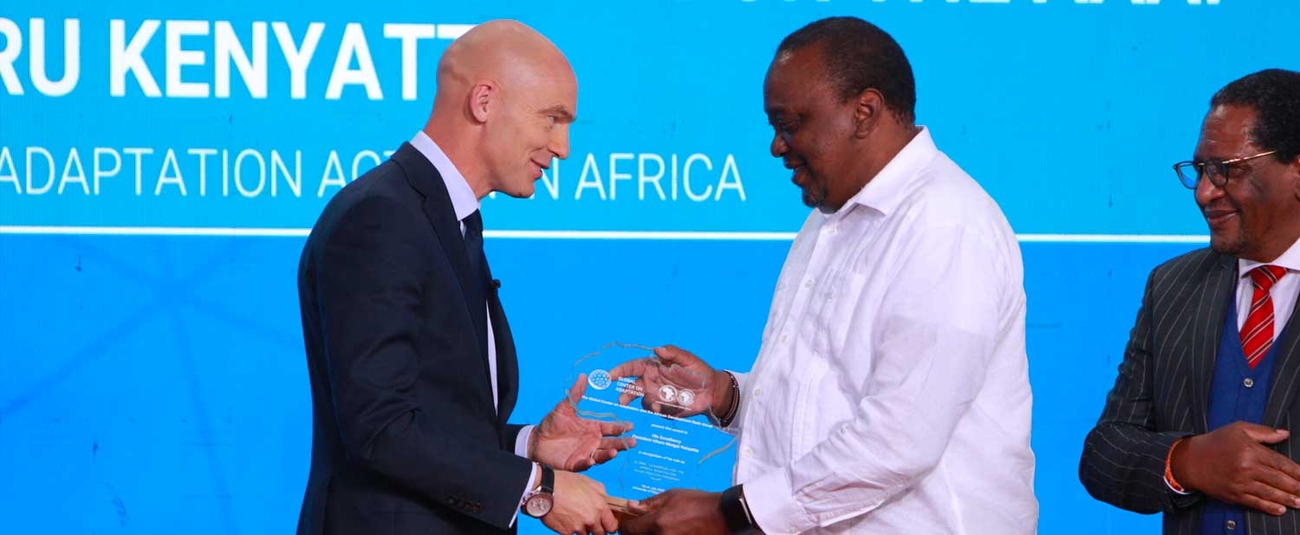
Global leaders on Thursday tasked Kenya’s President Uhuru Kenyatta to spearhead Africa’s effort to address climate change under the Africa Adaptation Acceleration Program (AAAP).
The Leaders Dialogue on Climate Adaptation, organized by the Global Center on Adaptation (GCA) on 7 July at the University of Nairobi, featured endorsements by the GCA Chair and 8th Secretary-General of the United Nations, Ban Ki-moon; African Development Bank Group President, Dr Akinwumi Adesina; World Trade Organization Director Ngozi Okonjo-Iweala; and IMF Managing Director Kristalina Georgieva.
President Kenyatta thanked former Secretary-General Ban Ki moon and GCA CEO Professor Patrick Verkooijen for giving him the role of AAAP Global Champion. He said: “Africa has been most adversely affected by climate change. Adaptation is not just important. It is a survival strategy.” Kenyatta recognized the joint efforts of the three multilateral institution heads “for their tireless efforts in championing the adaptation agenda.” He said: “I am confident that with support from friends like these, we shall reach our goal.”
Adesina said: “We need a champion, a tested leader with a respected global voice. President Kenyatta is a doer. He is a climate-friendly leader. His dynamism, voice and leadership will help as we drive for greater financing for climate adaptation for Africa.”
He explained that Africa loses 7 to 15 billion dollars every year because of climate change, and this figure was expected to rise to $50 billion per year by 2030. He said while nine out of the 10 most vulnerable countries to climate change (90%) were in Africa—accounting for just 4% of global carbon emissions—the continent received only 3% of total, global climate finance.
Adesina added: “Climate change is unfair to Africa and global finance on climate is unfair to Africa. The Bank is leading efforts to support Africa to adapt to climate change. We have doubled our climate finance to reach 25 billion dollars by 2025. We now devote 67% of our total climate finance to climate adaptation, the highest level among all multilateral financial institutions globally.”
Verkooijen said: “This is the battle of our lives, to contain climate change, to adapt to it, and by doing so, tame it. And in you, President Kenyatta, we have a champion lion tamer indeed.”
He highlighted some of President Kenyatta’s achievements and his strong record in standing up for Africa. “This record is globally unmatched,” said Verkooijen. “You pioneered Kenya’s commitment to land degradation neutrality. You ratified the Paris Agreement in record time. You made Kenya one of the first countries globally—not just in Africa but globally—to announce and submit ambitious NDC (Nationally Determined Contributions) targets, and there is much more.”
Verkooijen also recounted visits to Kenya’s Makueni County and Samburu County, where the community is investing in resilience with support from the African Development Bank. With the Bank’s support, he said, they are building water pans and boreholes that reduce the need to seek pasture far from home and which also create economic opportunities to grow crops, diversify incomes and build resilience for forests during the challenging times caused by failing rains.
Verkooijen encouraged the university students not to lean backwards but to lean forward and take advantage of this opportunity to engage in the adaptation agenda for Africa. “You are the future of the adaptation challenge. We look to you to develop innovative solutions for a resilient continent.” He told them he would return to announce the winners of the Disruptive Technologies Entrepreneurship Challenge in Kenya, where GCA and the University will award 50 million shillings ($485,000) each to scale up the most innovative solutions for climate-resilient infrastructure.
Vice Chancellor Stephen Kiama said a landmark partnership agreement between the GCA and the university would support a robust pipeline of investment for infrastructure in Kenya, enhancing climate finance, creating green adaptation jobs, and supporting Kenyan entrepreneurs in the scaling up of sustainable adaptation businesses.
Ban Ki-moon said President Kenyatta’s voice as a statesman had already carried the message across the world. He said: “Amid the bad news, the Africa Adaptation Acceleration Program is rapidly scaling up to deliver solutions on the ground. We are in a long, hard marathon. We have a true champion in you. Thanks to your commitment and determination, I know that Kenya will prove itself, through your government’s partnership with the GCA and the AAAP to be a climate adaptation example for others to follow."
IMF Managing Director Kristalina Georgieva said President Kenyatta’s international leadership on climate adaptation had inspired others to step up climate action. Georgieva said: “People everywhere face sharp cost of living increases, and food insecurity is dangerously rising in many regions. Many African countries must also contend with frequent, extreme weather events that bring human tragedy and socioeconomic disruption.”
She stressed the urgency for the green transition to include investments in resilience. She said Sub-Saharan African countries need to spend at least 2-3% of GDP per year on climate adaptation. “No country can do it alone, especially as many have elevated debts following the pandemic crisis.” She said it was critical for the international community to meet or exceed the goal of providing $100 billion in climate finance to developing countries each year, and importantly to make sure that a sizeable amount of the climate finance goes to adaptation in addition to mitigation.
WTO Director-General Ngozi Okonjo-Iweala commended Kenyatta for being a driving force behind the AAAP. She said his strong voice and leadership would inspire others to scale up and accelerate the actions required to adapt to climate change. She emphasized that trade was a necessary part of the solution to climate change adaptation and mitigation. “Just like the rest of our economic systems,” she said, “trade and the WTO can and must change to best support the just transition to a low global carbon economy and a climate resilient society”.
.embed-container { position: relative; padding-bottom: 56.25%; height: 0; overflow: hidden; max-width: 100%; } .embed-container iframe, .embed-container object, .embed-container embed { position: absolute; top: 0; left: 0; width: 100%; height: 100%; }
AfDB President’s remarks during the Leaders’ Dialogue on Adaptation Action in Africa
Africa Adaptation Acceleration Program showcases African youths driving climate innovation
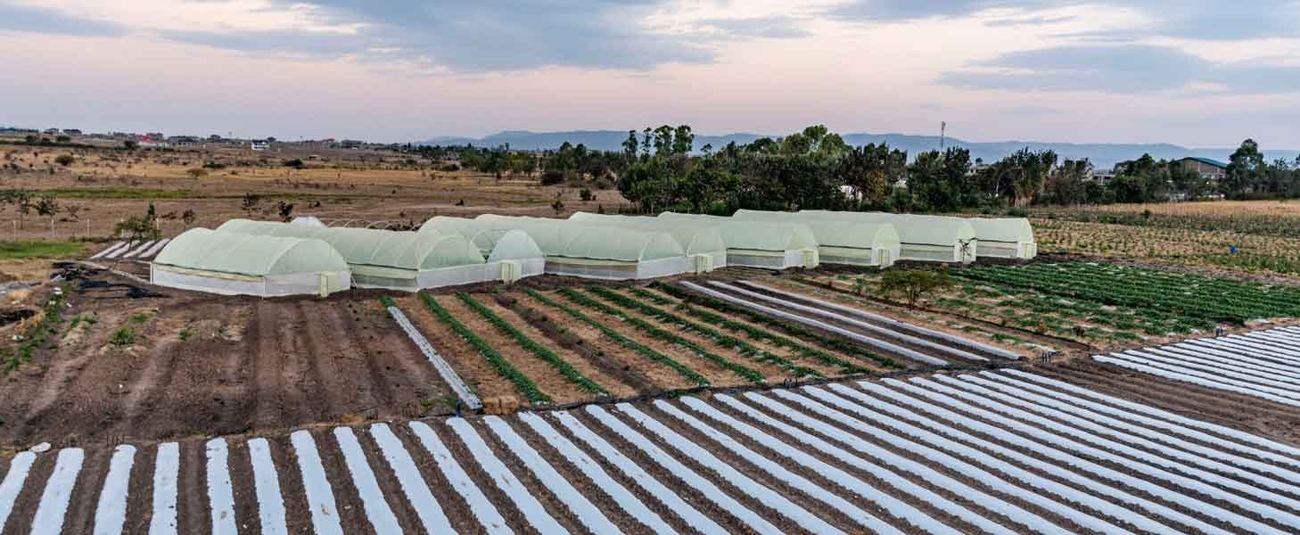
The Africa Adaptation Acceleration program (AAAP) – a joint initiative of the African Development Bank and the Global Center on Adaptation – recently showcased its initiative to harness the dynamism and leadership of Africa’s youth to drive climate adaption innovation.
On the side-lines of the recent 3rd Gobeshona Global Conference(link is external), AAAP brought together participants in its YouthADAPT program to share their experiences with the program as well as strategies to scale up youth-led approaches to adaptation
In his opening remarks, Dr. Kevin Kariuki, African Development Bank Vice President for Power, Energy, and Climate & Green Growth underscored young people’s integral role in Africa’s sustainable development.
“Youth form the backbone of Africa’s population, constituting over 60% of the population. The continent’s sustainable development hinges on harnessing this demographic dividend,” Kariuki said. “The AAAP, through its YouthADAPT pillar, has so far supported 35 youth-led enterprises in 14 African countries with $3.5 million to drive climate actions in sectors such as agriculture, waste management, renewable energy, water and sanitation,” Kariuki added. YouthADAPT is one of AAAPs four pillars for accelerating climate adaptation.
Caroline Mukuhi Mwangi, founder of Kimplanter Seedling(link is external) and Nurseries Limited, said her company was already seeing the benefits of participation in the program. Kimplanter provides drought resistant seedlings that boost food production and food security in Kenya.
Mwangi said, “We have ventured into new markets in semi-arid regions and expanded our seedling varieties, increasing our revenue by 36% as a result of AAAP support. Our customer base has also grown from 8,000 to 16,000 farmers and we have increased our staff from 17 to 32, all of whom are women or youth.”
Aramide Abe, the Program Lead of Jobs for Youth & Entrepreneurship at the Global Center on Adaptation(link is external) confirmed that participating enterprises have already begun to show results. She said some have seen revenues rise by up to 50 percent. A fifth have ventured into new markets and have raised over $106,000 in additional funding from different sources.
Juveline Ngum, the founder of Bleaglee Waste Management Limited, a Cameroon-based start-up company using drone technology to tackle waste disposal, also stressed the benefits of participating in YouthADAPT.
“We have expanded our waste disposal management solution from west Cameroon into Douala, effectively using drones to detect clogged drainages and utilizing data for demand driven waste management,” Ngum said. Now, we aim to expand across national borders into Dakar, Senegal.”
Noël N'guessan’s Cote d’Ivoire-based company, LONO(link is external) – a winner of the 2022 YouthADAPT challenge – has patented technology for the production of organic fertilizer. The company has also introduced modular and mobile bio digesters for the agri-food sector. Biodigesters use microbes and other bacteria to break down organic waste including fat, greases, and even animal manure.
Still, Nguessan said challenges remained. “The cost of prototyping hardware equipment can be prohibitively high, resulting in lengthy project development cycles, “he said. He pointed to financial management training as vital for youth-led businesses.
The session also featured presentations by African Development Bank partners and other global organizations that have rolled out similar initiatives to YouthAdapt.
Sandra Simbiri, Program Specialist at UNICEF’s Generation Unlimited(link is external), said:
“Supporting entrepreneurs through STEM principles is key to preparing the young for technological innovations.”
Alfred Asiko, Senior Market Engagement Manager for the ClimateTech Programme at GSMA(link is external), a mobile technology association, said it has played a role in empowering youth to deploy such technologies as the Internet of Things, artificial intelligence and blockchain to tackle climate challenges.
“Through our innovation fund, we offer grants to climate startups, with a focus on supporting resilient solutions that utilize frontier technologies. We also provide skills development and training to help entrepreneurs succeed in scaling their innovations,” Asiko said.
He said that venture capital (VCs) firms had a critical role to play. ”We need to see more VCs stepping up and taking over from development finance institutions (DFIs) in providing financing and support to youth-led businesses,” he added.
YouthADAPT targets reaching 10, 000 African youth-led enterprises by 2025, promoting innovation and inclusive growth for young people in climate resilient jobs and through youth enterprise development. The AAAP’s other three pillars are Climate-Smart Digital Technologies for Agriculture and Food Security; the African Infrastructure Resilience Accelerator and the Innovative Financial Initiatives for Africa
The third annual Gobeshona Global Conference, organized by the International Centre for Climate Change and Development, took place virtually from 10-16 March 2023. It focused on monitoring Locally- Led Adaptation (LLA) and resilience.
